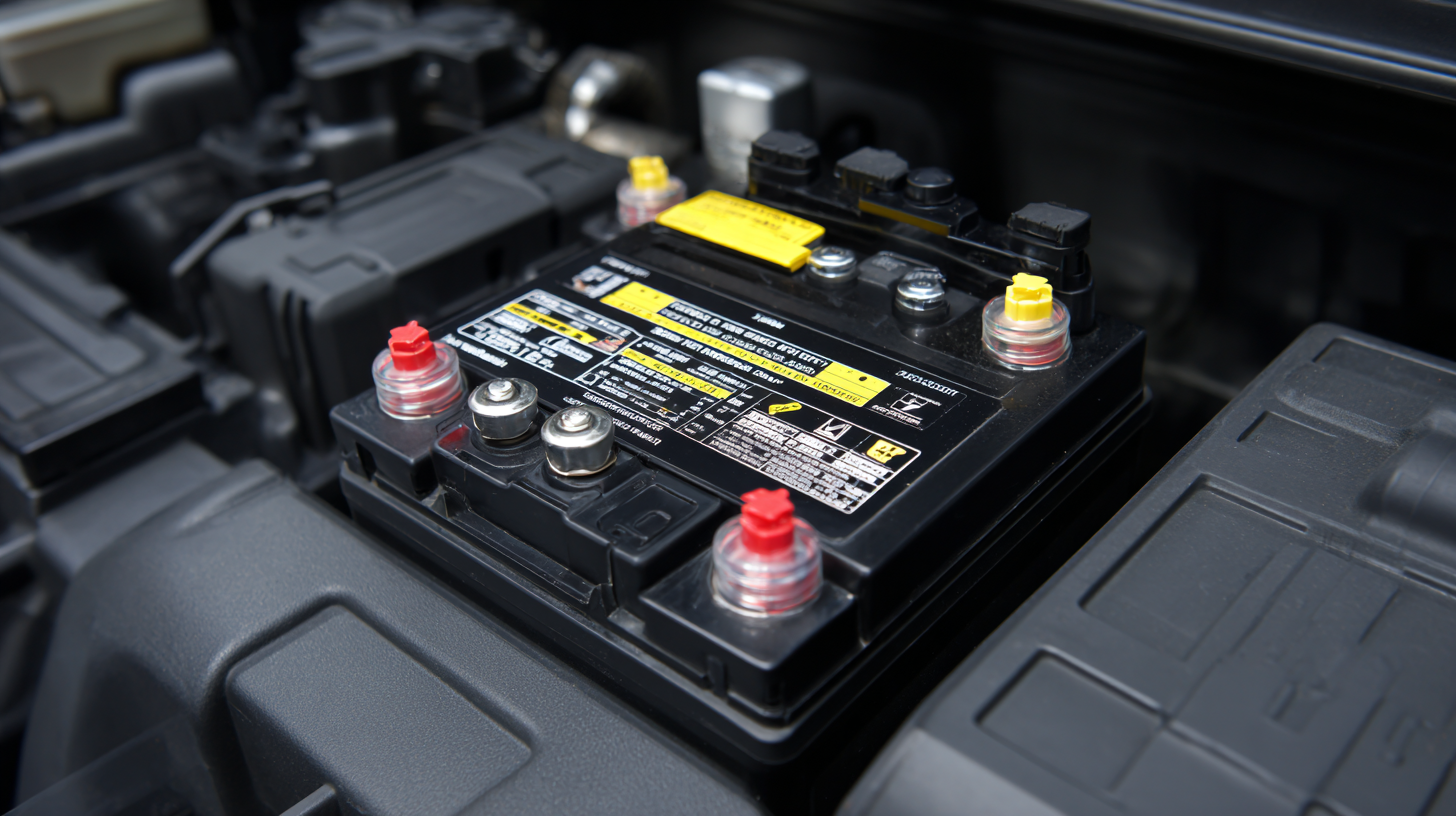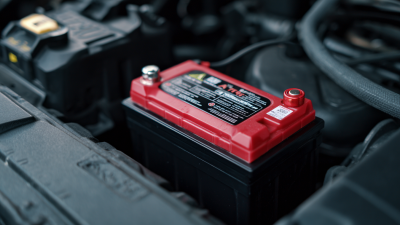In the ever-evolving landscape of automotive technology, the quest for the longest lasting car battery is a pursuit that captivates both manufacturers and consumers alike. Renowned expert in battery technology, Dr. Alan Greene, emphasizes the importance of longevity in his field, stating, "The longest lasting car battery not only enhances vehicle performance but also reduces the environmental impact of frequent replacements." With the rising costs of vehicle maintenance and the increasing significance of sustainability, understanding how to achieve optimal battery performance has never been more crucial.
This article delves into the secrets behind the longest lasting car battery, revealing insights and practical tips for vehicle owners looking to extend their battery life. From the choice of battery type to proper maintenance practices, we will explore the key factors that contribute to enhanced durability and reliability. By implementing these strategies, drivers can not only improve their vehicle’s efficiency but also enjoy the peace of mind that comes with knowing they are maximizing their investment. Join us as we unpack the top five tips to ensure that your car battery remains a steadfast companion on the road for years to come.

Car batteries are essential components that power our vehicles and ensure optimal performance. Understanding the anatomy of car batteries can provide valuable insights into their longevity. A typical car battery consists of lead plates submerged in an electrolyte solution of sulfuric acid and water. This combination allows for a chemical reaction that generates electrical energy. High-quality materials and precise manufacturing processes contribute significantly to a battery's lifespan, while proper maintenance can further enhance its durability.
To ensure the longevity of your car battery, regular maintenance is key. First, keep the battery terminals clean and free of corrosion. A buildup of grime can impede the electrical connection, leading to decreased performance. Secondly, make a habit of checking the battery's fluid levels, topping them off with distilled water if necessary. Additionally, avoid short trips, which can prevent the battery from fully recharging. By allowing your battery to maintain a consistent charge, you will not only maximize its lifespan but also ensure your vehicle runs smoothly.
| Battery Type | Average Lifespan (Years) | Maintenance Requirements | Temperature Sensitivity | Best Practices for Longevity |
|---|---|---|---|---|
| Lead-Acid | 3-5 | Periodic checks, water refills | Very sensitive to heat | Regular charging, clean terminals |
| AGM (Absorbent Glass Mat) | 4-7 | No watering needed | Sensitive but more tolerant than lead-acid | Avoid deep discharges, store fully charged |
| Lithium-ion | 8-12 | Minimal maintenance required | Optimal at 20-25°C | Keep charged, avoid extreme temperatures |
| Nickel Metal Hydride (NiMH) | 6-8 | Occasional cycling | Moderately sensitive | Regular discharge and recharge |
To extend the lifespan of your car battery, adhering to essential maintenance practices is crucial. Regularly checking the battery's terminals for corrosion can prevent power loss and ensure a stable connection. Cleaning the terminals and tight connections will help maintain optimal performance. Additionally, ensuring that your battery is fully charged and avoiding deep discharges can significantly enhance its longevity. Modern car batteries are designed to withstand a range of conditions, but consistent vigilance in battery health is key.
Another vital aspect of battery maintenance is monitoring the ambient temperature in which the vehicle operates. Extreme temperatures, both hot and cold, can adversely affect battery performance and lifespan. Utilizing a smart battery charger can help maintain the charge without overloading, effectively preserving battery health. Moreover, understanding the circular economy regarding battery use—repairing, reusing, and recycling—can contribute positively to not only extending the battery life but also reducing waste through innovative recycling technologies.
When it comes to maximizing the efficiency of your car battery, employing optimal charging techniques is crucial. One essential practice is to avoid frequently topping off your battery charge. Instead, allow your battery to discharge slightly before recharging it. This helps to maintain the battery’s capacity and extends its overall lifespan, as consistently charging it to full can lead to a phenomenon known as "gassing", which reduces the battery’s effectiveness over time.
Another important tip is to ensure your battery is charged at the correct voltage. Most car batteries require a charge between 12.4 to 12.7 volts when fully charged. Using a smart charger can help manage this process, preventing overcharging and optimizing the charging cycle. Additionally, consider charging your battery during cooler parts of the day, as excessive heat can negatively impact performance and longevity.
Lastly, regular maintenance is vital for optimal battery performance. Clean the battery terminals and ensure there’s no corrosion, as this can hinder the flow of electricity. If your battery has removable caps, check the electrolyte levels and top them off with distilled water when necessary. Following these tips will contribute significantly to the lifespan and reliability of your car battery.
When aiming for a longer-lasting car battery, avoiding common mistakes is essential. One major error drivers frequently make is neglecting battery maintenance. According to a report from the Battery Council International, regular inspections can increase battery life by up to 30%. Drivers should make it a habit to check for corrosion on battery terminals and ensure that connections are tight and clean. Additionally, topping off fluids in non-maintenance-free batteries can prevent damage from low levels, which can significantly extend the battery's lifespan.

Another common pitfall is inconsistent driving habits. The National Institute for Automotive Service Excellence highlights that frequently short trips can prevent a battery from fully recharging, leading to premature failure. Ideally, car owners should engage in longer drives at least once a week to allow the alternator to replenish battery charge effectively. Lastly, extreme temperatures can also affect battery longevity; a study by the Department of Energy suggests that batteries lose about 50% of their strength at 0 degrees Fahrenheit. Parking in a shaded or climate-controlled area can mitigate these effects, further enhancing battery performance and life expectancy.
As car batteries age, their performance can significantly decline, making it essential for drivers to recognize the signs of battery deterioration. One of the most noticeable indicators is a slow engine crank, where the engine struggles to start. If you hear a sluggish turning over when you attempt to start your vehicle, it may be time to evaluate your battery. Additionally, more frequent jump-starts or electrical issues, such as dimming headlights or unresponsive dashboard lights, can signal that your battery is nearing the end of its lifespan.

To ensure optimal battery performance and longevity, consider following these tips. Regularly check the battery terminals for corrosion and clean them if necessary, as corrosion can hinder the flow of electricity. Furthermore, avoid leaving your vehicle unused for extended periods, as this can lead to a discharge of the battery. If you're unsure about your battery's condition, many auto parts stores offer free battery testing services, which can help you determine whether a replacement is imminent. Keeping an eye on these subtle signs can save you from unexpected breakdowns and prolong the life of your vehicle’s battery.



